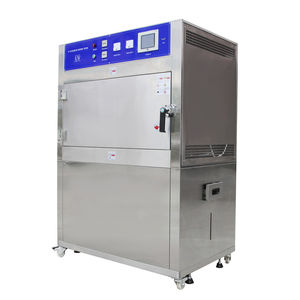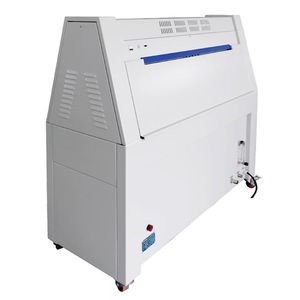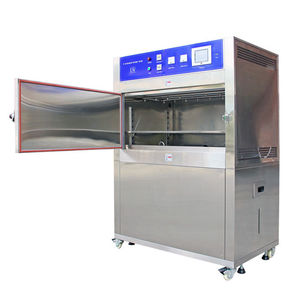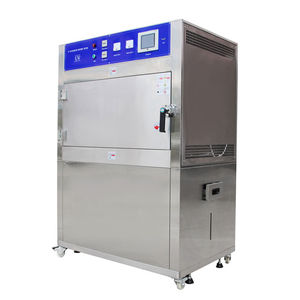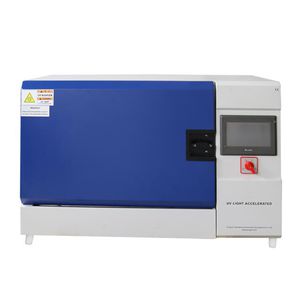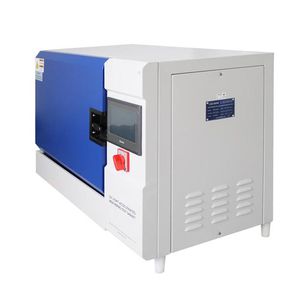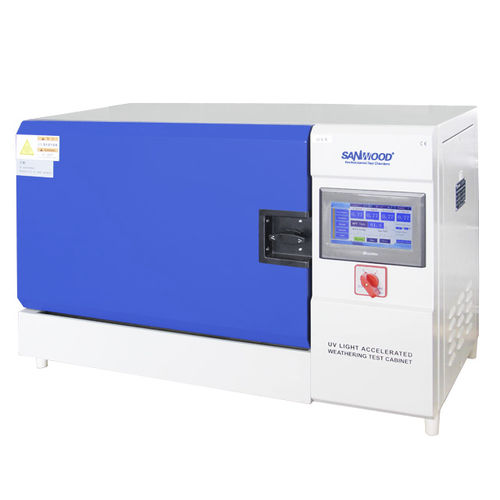
- Metrologia - Laboratorio
- Metrologia e Prove
- Camera per test termostatica
- Sanwood Technology
Camera per test termostatica Bench-top UVdi temperaturadi invecchiamento alla luce UVdi illuminazione







Aggiungi ai preferiti
Confronta con altri prodotti
Caratteristiche
- Tipo
- termostatica
- Parametro controllato
- di temperatura
- Tipo di test
- di invecchiamento alla luce UV, di illuminazione
- Uso previsto
- per banco di prova
- Configurazione
- da banco
- Sorgente luminosa
- UV
- Altre caratteristiche
- in acciaio inossidabile
- Temperatura
Min.: 5 °C
(41 °F)Max.: 60 °C
(140 °F)- Lunghezza
930 mm
(36,61 in)- Larghezza
630 mm
(24,8 in)- Profondità
460 mm
(18 in)
Descrizione
Water spray system
For some applications, water spray can better simulate the environmental conditions of the end use. Water spray is very effective in simulating thermal shock or mechanical erosion due to temperature drastic changes and due to rain washout. Under certain practical conditions, such as sunlight, when the accumulated heat rapidly dissipates due to sudden showers, the temperature of the material changes sharply, producing thermal shock, which is a kind of material for many materials. test. BUV water spray can simulate thermal shock and/or stress corrosion.
The BUV spray system consists of 12 pieces nozzles (6 pieces on each side), connecting tubes, control and drain sections. The nozzle is mounted between the UV lamps, and during the cycle, when the lamp is extinguished, water is sprayed onto the sample. The sprinkler system can be run for a few minutes and then turned off. This short spray of water cools the sample quickly and creates conditions for thermal shock.
VIDEO
Cataloghi
Nessun catalogo è disponibile per questo prodotto.
Vedi tutti i cataloghi di Sanwood TechnologyAltri prodotti Sanwood Technology
UV Lamp Weathering Test Chamber
Ricerche correlate
- Macchina per test
- Camera per test
- Macchina di misura
- Macchina per prova per materiali
- Macchina per test automatica
- Macchina per prova controllata da computer
- Camera per test di temperatura
- Macchina per test di compressione
- Camera per test climatica
- Macchina per test verticale
- Macchina per test universale
- Camera per test di umidità
- Macchina per test di flessione
- Macchina per test di tensione
- Macchina per test per laboratorio
- Macchina per test di precisione
- Tester ad uso industriale
- Camera per test in acciaio inossidabile
- Macchina per test idraulica
- Tester automatico
* I prezzi non includono tasse, spese di consegna, dazi doganali, né eventuali costi d'installazione o di attivazione. I prezzi vengono proposti a titolo indicativo e possono subire modifiche in base al Paese, al prezzo stesso delle materie prime e al tasso di cambio.



